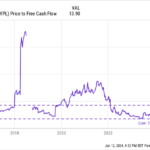Betting on megacap growth has been a winning strategy.
Investors often take on the challenge of picking individual stocks to beat the market or simply invest in a way that suits their risk tolerance and helps accomplish their financial goals. But finding a quality, low-cost, exchange-traded fund (ETF) that achieves diversification and can beat the market is a passive investors’ dream come true.
If you had Invested in the S&P 500 (^GSPC -0.27%) five years ago, you would have doubled your money. The Nasdaq Composite (^IXIC -0.18%) put up an even better return. But the Vanguard Mega Cap Growth ETF (MGK -0.23%) takes the cake with a 138% total return over the last five years.
Here’s why this ETF has what it takes to continue outperforming the major indices.

Image source: Getty Images.
A fund chock-full of leading growth stocks
If you’re familiar with ETFs, you’ve probably heard of the Vanguard S&P 500 ETF (VOO -0.29%), which mirrors the performance of the S&P 500. There’s also the Vanguard Mega Cap ETF (MGC -0.32%), which has about 300 fewer holdings than the Vanguard S&P 500 ETF and concentrates on the largest U.S.-based companies by market capitalization.
Then there’s the Vanguard Mega Cap Growth ETF, which only has 79 holdings and targets the largest, highest-growth companies. This strategy makes the fund extremely top-heavy. Of this fund, 81% is allocated in the technology, communications, and consumer-discretionary sectors — an even higher concentration than the Nasdaq Composite.
|
Sector |
Vanguard Mega Cap Growth ETF |
Vanguard Mega Cap ETF |
Nasdaq Composite |
Vanguard S&P 500 ETF |
|---|---|---|---|---|
|
Technology and Communications |
59.4% |
41.2% |
63.2% |
38.3% |
|
Consumer Discretionary |
21.6% |
14.1% |
14.1% |
10.3% |
|
Industrials |
7% |
10% |
4.3% |
8.8% |
|
Health Care |
6.9% |
12.2% |
6.9% |
12.3% |
|
Financials |
1.7% |
10.1% |
4% |
13.1% |
|
Basic Materials |
1.5% |
1.2% |
1.1% |
2.4% |
|
Real Estate |
1% |
1% |
0.9% |
2.2% |
|
Energy |
0.60% |
3.9% |
0.7% |
4.1% |
|
Consumer Staples |
0.30% |
4.8% |
4% |
6.2% |
|
Utilities |
0% |
1.5% |
0.9% |
2.3% |
Data sources: Vanguard, Fidelity.
Due to its structure, this fund will essentially win or lose based on a handful of sectors and companies.
Mega domination
For the Vanguard Mega Cap Growth ETF to continue outperforming the S&P 500 and Nasdaq Composite, big tech has to keep beating the market. And for that to happen, big tech has to grow earnings at a faster rate than the market and enjoy a premium valuation relative to the market. It takes both strong fundamentals and investor optimism to be a market-beating sector.
The Vanguard Mega Cap Growth ETF takes it one step further by betting on big tech, not just tech, to produce outsized gains. In recent years, especially over the last 18 months or so, the largest companies have ballooned to levels once thought impossible.
Apple is knocking on the door of a $3 trillion market cap to join Microsoft in that exclusive club. Nvidia and Alphabet are both worth over $2 trillion, with Amazon close behind at 1.9 trillion. The combined market capitalization of the “Magnificent Seven” stocks alone is $14.2 trillion. For context, the market cap of the entire S&P 500 just 11 years ago was $14 trillion.
Given the pace of value creation by big tech, it may seem like a slowdown is bound to happen at some point. But big tech has already suffered slowdowns — several in fact during its torrid run. The Vanguard Mega Cap Growth ETF fell over 22% between Oct. 1, 2018 and Christmas Eve 2018, mainly due to U.S.-China trade-war tensions. More recently, it lost over a third of its value in 2022.
Megacap growth will likely continue to be volatile in the years and decades to come because these companies’ valuations are based largely on future-earnings growth rather than on trailing earnings.
This ETF has room to run
The most important question growth investors should ask is whether megacap growth will be able to monetize artificial intelligence (AI) or whether AI will be a net disruptor of big tech and lead to smaller companies displacing today’s largest companies over time.
The history of the tech sector is riddled with smaller innovative companies taking market share and even bankrupting incumbents. Why should AI, the next evolution of tech, be any different? But in general, I think megacap tech is very well-positioned to monetize AI, probably better than smaller companies. We’ll use Microsoft as an example since it’s currently the most valuable company in the world.
Microsoft has done an excellent job of using AI as an upgrade for legacy solutions. Microsoft’s generative AI assistant, called Copilot, is available for the traditional Windows suite of applications as well as other products. Microsoft has also integrated AI to improve its cloud-infrastructure business through Azure OpenAI. GitHub AI is yet another example of taking an existing platform and using AI to accelerate growth.
Throw in Microsoft’s high margins, massive free-cash-flow generation, existing cash position, and rock-solid balance sheet, and the company has even more advantages to make strategic acquisitions or ride out a downturn. Microsoft’s diversified business model spans so many consumer- and enterprise-facing touchpoints that it’s hard to imagine it won’t be a net benefiter of AI.
Just a decade ago, a $3 trillion market cap seemed impossible. But I think 10 years from now, we’ll be looking at companies valued over $10 trillion, and Microsoft will be one of them because of its vast resources, market positioning, and runway for monetizing AI.
The snowball effect
For just a 0.07% annual fee — or 70 cents for every $1,000 invested — the Vanguard Mega Cap Growth ETF is one of the simplest and least expensive ways to invest in the largest-growth companies. At its core, it’s a bet on the big companies getting bigger due to their advantages.
Size arguably plays a bigger role in megacap growth than other sectors. In other sectors, like consumer staples, for example, a company like Coca-Cola can buy another beverage brand, but that simply adds another revenue stream. In Microsoft’s case, there’s a snowball effect with capital investments that can benefit multiple aspects of the business.
Investors who believe megacap tech is well-positioned to monetize AI should consider this Vanguard fund as a foundational holding worth buying and adding to over time.
Suzanne Frey, an executive at Alphabet, is a member of The Motley Fool’s board of directors. John Mackey, former CEO of Whole Foods Market, an Amazon subsidiary, is a member of The Motley Fool’s board of directors. Randi Zuckerberg, a former director of market development and spokeswoman for Facebook and sister to Meta Platforms CEO Mark Zuckerberg, is a member of The Motley Fool’s board of directors. Daniel Foelber has no position in any of the stocks mentioned. The Motley Fool has positions in and recommends Alphabet, Amazon, Apple, Meta Platforms, Microsoft, Nvidia, Tesla, and Vanguard S&P 500 ETF. The Motley Fool recommends the following options: long January 2026 $395 calls on Microsoft and short January 2026 $405 calls on Microsoft. The Motley Fool has a disclosure policy.
















Add Comment